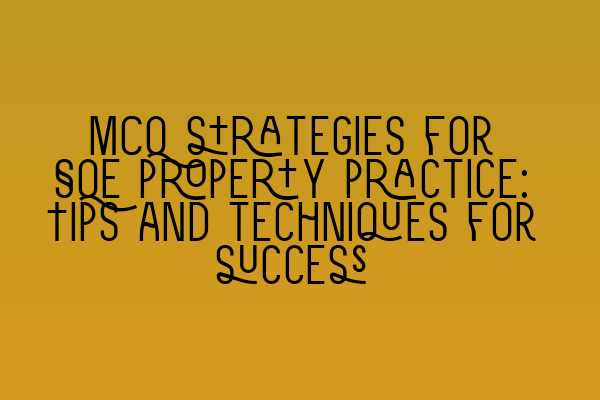MCQ Strategies for SQE Property Practice: Tips and Techniques for Success
Welcome to the blog of SQE Property Law & Land Law, where we provide expert advice and guidance on all aspects of property practice. In this post, we will be discussing valuable MCQ strategies that will help you succeed in your SQE property practice exams. Multiple-choice questions can be challenging, but with the right techniques, you can increase your chances of answering correctly. So, let’s dive in!
Tip 1: Read the question carefully.
The first and most important step is to read the question carefully. Take your time to understand what is being asked of you. Look for keywords and phrases that provide clues to the correct answer. Pay attention to any important details, such as dates, parties involved, or specific legal principles mentioned.
Tip 2: Identify the ‘wrong’ answers.
Once you have read the question, carefully assess each answer choice. Start by eliminating options that are clearly incorrect. Look for answers that contain absolute statements, extreme language, or unfamiliar terms. By identifying and excluding these wrong answers, you can narrow down your choices and focus on the remaining options.
Tip 3: Evaluate the ‘correct’ answers.
After eliminating the wrong answers, evaluate the remaining options. Read each answer choice thoroughly and compare them to each other. Look for nuances, differences in wording, or subtle distinctions. Often, examiners include answer choices that are similar but have slight variations. Take your time to consider each choice and determine which one aligns best with the question.
Tip 4: Use the process of elimination.
If you are unsure about the correct answer, use the process of elimination. Cross out options that are less likely to be correct. Even if you are unsure between two choices, eliminating other options can increase your chances of selecting the correct answer. Remember, there is no penalty for guessing, so taking an educated guess is better than leaving the question unanswered.
Tip 5: Pay attention to ‘exceptions’.
In property law, there are often exceptions to general rules and principles. Examiners frequently include these exceptions in MCQs to test your understanding of the finer details. Look out for choices that include words like ‘except,’ ‘unless,’ or ‘only if.’ These signal that the answer may involve an exception to the general rule. Be cautious and consider such options carefully.
Tip 6: Review your answers.
Before submitting your answers, make sure to review your choices. Double-check if you have answered every question and that you haven’t made any careless mistakes. Revisit questions you were uncertain about and evaluate your reasoning. However, be cautious not to change your answers unless you are confident that your initial response is incorrect.
Tip 7: Practice, practice, practice!
The key to mastering MCQs is practice. The more you expose yourself to different questions and scenarios, the better prepared you will be for the actual exam. SQE Property Law & Land Law offers a wide range of practice materials and mock exams to help you familiarize yourself with the format and content of the test. Make use of these resources and dedicate time to honing your MCQ skills.
In conclusion, MCQs can be challenging, but by applying these strategies, you can improve your chances of success in your SQE property practice exams. Remember to read the question carefully, eliminate wrong answers, evaluate correct options, use the process of elimination, pay attention to exceptions, review your answers, and most importantly, practice extensively. Good luck with your SQE property practice exams!
For more expert advice and guidance on property law and land law, visit SQE Property Law & Land Law. Stay tuned for more valuable tips and techniques to enhance your legal knowledge and excel in your career.
